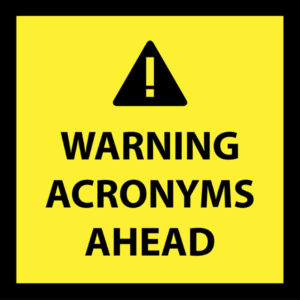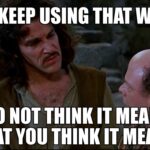 Screenwriting is Weird
Screenwriting is Weird
There are tons of “rules” in screenwriting that take a long time to figure out. Many of these so-called rules are shibboleths or leftovers from a bygone era that are handy at weeding out the amateurs from the pros.
However, most of the standards we see in screenwriting exist for a good reason. They allow for comprehension and clarity. Such is the case of using periods correctly with acronyms and initials in dialogue.
The Basics
When writing dialogue in a script, use periods if each individual letter is to be spoken by the actor.
That means acronyms like: D.O.D. (Department of Defense), D.E.A. (Drug Enforcement Agency), C.I.A. (Central Intelligence Agency), etc. It also means smaller two-letter acronyms like O.K. (better to just use “okay”), T.V. (abbreviation for television) and L.A. (Los Angeles).
It’s especially important to use periods for acronyms like I.D. (abbreviation for identification) and L.A., because “id” and “la” are both actual words with completely different meanings.
TV — on the other hand — is pretty unmistakable as the abbreviation for television. However, I’d still recommend writing it as “T.V.” in dialogue because it will be consistent with how you write other abbreviations or acronyms that are to be spelled out, and it makes for an easier read.
Why?
Because there are other acronyms that you would not use periods with in dialogue — even though as organizations, etc., they may be officially recognized with periods in their names.
I’m talking about acronyms like MADD (Mothers Against Drunk Driving), S.W.A.T. (Special Weapons and Tactics), etc. They are NOT pronounced by spelling out each letter.
So in dialogue, we write: SWAT, but in action lines, we write: S.W.A.T. — because that’s how it’s normally written. Dialogue writing is a special beast with special rules.
Acronyms like AWOL and MADD are written the same regardless of where they’re being used, because they’re both not spelled out and are officially written without periods.
Advanced Class
Remember, in dialogue write it like your actors should say it.
Pop quiz
In dialogue, how should you write…?
- NAACP (National Association for the Advancement of Colored People)
- LOL (Laugh Out Loud)
- ASAP (As Soon As Possible)
- 0500 (5 a.m.)
Answers:
- NAACP is typically pronounced: N double-A C.P. So that’s how you’d write it.
- LOL can be pronounced two different ways, so it depends on how you want your actor to pronounce it — LOL or L.O.L.
- Similarly, ASAP is pronounced two different ways. So A.S.A.P. or ASAP would be acceptable.
- 0500 is military speak and is usually pronounced: O-five hundred. So that’s how you’d write it. I’ve also seen it written as “oh-five hundred,” but I disagree with that approach because it’s easier to misinterpret the “oh” part. At a glance, you may interpret it to mean : “um, five hundred,” with the “oh” as a throwaway exclamation or pause.
If you follow these simple rules, you can also get away with capitalizing words for emphasis (sparingly) without actors having to stop and think about whether or not you’re suggesting the word is an acronym and should be spelled out.
Luckily, these are all things I flag when I proofread your script. Any other dialogue peculiarities trip you up?





In writing, we typically include the term first and then the abbreviation in brackets. Mothers Against Drunk Driving (MADD). How would I adapt this for a voice-over script?
Hi Sherri, great question.
For V.O. you’d have to write it out explicitly. Something like: “In a statement released today, Mothers Against Drinking and Driving, or MADD, said that they would…”
Then you’d be able to use MADD exclusively thereafter.